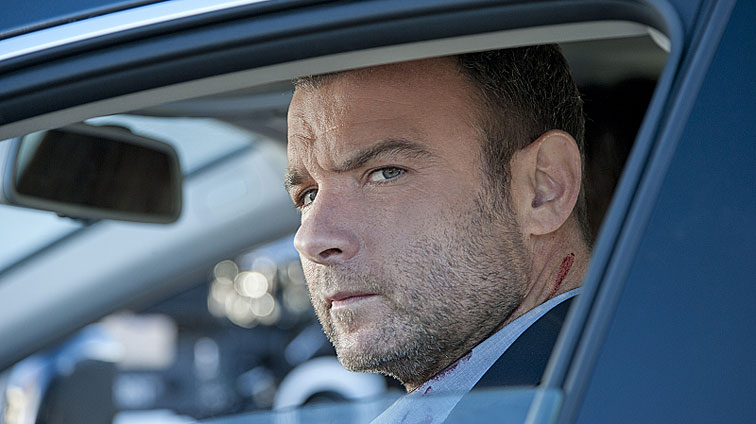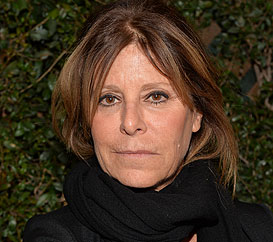
In the Company of Men
Ray Donovan creator Ann Biderman pulls no punches about why she doesn’t worry over her characters’ likeability and why gender should have nothing to do with what one writes.
 Ann Biderman
Ann Biderman
I don't worry about [a character’s] likeability. I worry about someone having a complicated life, both inner and outer, and things that people can relate to. Is it human, is it real?
To survive in Ray Donovan’s world, you gotta be a tough guy. The Showtime drama about a Hollywood fixer in its second season doesn’t pull any punches—literally. The action is brutal. Both justice and vengeance are swift. In the middle of it all is Ray, the latest in a long line of tough-as-nails anti-heroes ranging from Raymond Chandler’s Philip Marlowe to David Chase’s Tony Soprano.
Because of all this grit, it might surprise the unenlightened reader to learn that the show’s creator and showrunner, Ann Biderman, is a woman.
“I was always interested in Raymond Chandler and Dashiell Hammett,” explains Biderman, whose hardboiled resume includes the shows NYPD Blue and Southland, as well as the movies Primal Fear and Public Enemies, “I always liked detective fiction. It seemed sexy to me.”
In Biderman’s opinion, gender has nothing to do with who writes what. “I don't think, ‘Wow, that David Chase is such an interesting male showrunner, what a man!’ I just think, ‘He’s a great showrunner and what a show!’
“Of course,” she adds after a beat, “It's not like I don't like a good frock or a good pair of high heels, but I don't want to write about it particularly.”
Ray Donovan doesn't seem terribly high concept; it's very character-driven. How did you get that through the system?
I'm not sure they thought it was low concept. When you hear “fixer” in the world of Hollywood, that's high concept enough to sell it.
But the great thing about Showtime is they're incredibly smart, so the characters appealed to them. I sold it with all the characters intact, as a character piece. It's a hybrid and that also probably appealed.
What do you mean by hybrid?
It's really a character study, but on the face of it it's a genre piece at the same time. It falls under the rubric of detective fiction or detective drama, doesn’t it? He functions as a detective in a way. There have been tough guys who are detectives or PIs or fixers. The name might change, the absolute job description might change, but they're all doing the same thing. In that way it is a genre piece, but it's also very much a character piece, so it is a hybrid.
How on earth did you make him—or any other anti-hero—likeable?
I don't worry about likeability. I worry about someone having a complicated life, both inner and outer, and things that people can relate to. Is it human, is it real? Most people have a brother, most people have a family member who has drug or alcohol problems. Many people have troubled marriages, many people have kids who are confused by their lives. I'm more interested in things being relatable.
So when you guys are in the room there’re not moments when someone says, "Ooh, he’s too bad," or “He’s not bad enough.”
No, we don't. We think about if is this right for the story we're telling and is it right for the character and is it believable?
Ray, in particular, is more tormented by the bad things he does than, say, Tony Soprano. Was that intentional?
It wasn't intentional to compare him to other characters and say he has more of a conscience. Again, it really had to do with Ray's morality and where he draws the line. That’s something that we're exploring. It's a huge theme. He’s not a killer in the way that Tony Soprano is. His demons are different; they're his and they're personal. So you're constantly thinking about where is his own personal line and when does he cross it?
It really gets back to the hybrid thing. Character study of a hardboiled type.
I just think a true sociopath isn't terribly interesting.
What's interesting, too, though, is that all these Hollywood people think of themselves as morally superior to Ray when, in fact, he has a lot more of a code. You know, he's not going to kill his own dad, yet he's being pushed to do that by his boss.
I guess what you're saying is Hollywood is more ruthless than he is, which in a sense is true.
You do a really good job weaving all those plot lines together. How do you do that?
We do a lot of different things. We keep notes, we tape strips to a table, we have huge boards. We do it all, you know? Sometimes we get tired of cards, and we'll just go to strips of paper, and we'll do a cursory outline and then move the strips around. Sometimes we'll have the boards with one storyline per board, and there'll be three or four an episode. It changes depending on where we are and what our tolerance is for any particular method at that moment.
A lot of shows, very good shows, will have subplots that come up then just taper off and you never find out what happens. I don't think you've done that in this series. How do you keep things so tight? Do you ever say, "Let's just introduce this and see what happens?"
No, we know where we're going with characters that are introduced. I mean sometimes they'll surprise you and you'll extrapolate and have a character live longer than you expected because they're so good, but once we introduce them we know what their purpose is.
Variety asked you this question but you didn’t say much. What are the challenges you face as a female showrunner?
That question kind of bores me a little bit, I'm sorry to say. It's just I don't see myself as a female showrunner, I don't know what's wrong with me, but I don't. I know there aren't that many of us, and I'm very proud, but I don't really think in terms of gender.
But female showrunners often focus on female-centric material, whereas your shows don’t.
I've written about what I wanted to write about and these are the things that I'm interested in. I guess it’s more male-centric material, but I just don't break it down like that. I just don't.
Do you still have all guys in the writers’ room with season 2?
I do, I do. But I tried very hard to hire women, believe me. It just hasn't worked out. I don't make a big deal about it one way or another. I'm looking for the best candidate at that particular moment when I'm hiring. Most of the room came back and I hired Michael Tolkin who's an old friend, I brought in Cheo Coker who I'd worked with on Southland. And everybody else came back.
And you would never be concerned about people criticizing you for not hiring more women?
Couldn't care less. You know, I have a woman DP who's phenomenal, a co-DP who's great, women don't traditionally do that. I have male editors, female editors, I have women doing all kinds of things on the show in many capacities.
I begged Michelle McLaren to come on the show because I felt her voice would work well with our voice. Do you know what I mean? But I'm not going to hire a woman just to hire a woman who I don't feel has a particular affinity for this material. Again, I'm not very PC.
Do you see an end for the show? And if so, again, talking about all these plot lines, do they all work towards that?
In a loose way, yes. If we get picked up again it would be our third year so there has to be a grand scheme in mind. But there are ideas that come up and we'll say, "That's a great third year arc," or, "That would be great for the fifth year." Wishful thinking but yes, when I started it I had some ideas of where it was going.
So do you know the fate of all the characters in your head?
Not entirely, but in part, yes.
So if we were out in a bar and you were three martinis deep could I get you to tell me what happens to Ray Donovan?
I would probably not be specific about it, but in some general sense yes.
© 2014 Writers Guild of America West
